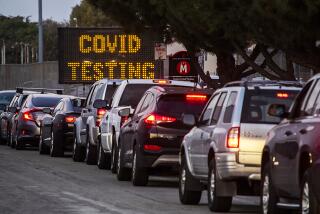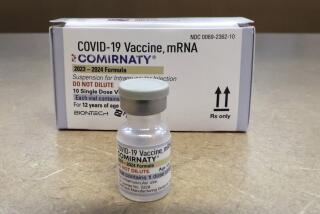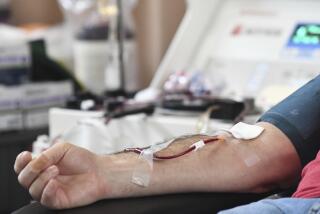CDC Urges Widespread HIV Testing
- Share via
Every American between the ages of 13 and 64 should be screened for an HIV infection when they encounter a doctor or a hospital in an effort to identify the quarter-million people who are infected and do not know it, government officials recommended Thursday.
The Centers for Disease Control and Prevention also called for increased testing of pregnant women to further reduce the already low transmission of the virus from mothers to infants.
The increased testing would be voluntary but would be offered on an “opt-out” basis in which patients would receive the test unless they explicitly refused it. The guidelines also would no longer require written consent for the test and pretest counseling -- requirements that now provide a major impediment to widespread testing.
“By identifying people earlier through a screening program, we’ll allow them to access life-extending therapy and also, through prevention services, learn how to avoid transmitting HIV infection to others,” Dr. Timothy Mastro, acting director of the CDC’s division of HIV/AIDS prevention, said at a news conference.
Most physicians and activist groups were pleased with the recommendations, which the CDC spent three years refining.
“We see far too many patients who were never tested for HIV before they became sick with AIDS,” said Dr. Daniel R. Kuritzkes, chair of the HIV Medicine Assn.
Early detection, moreover, halves the cost of providing care, added Dr. Michael S. Saag, director of the Center for AIDS Research at the University of Alabama at Birmingham.
The new guidelines, published Thursday in the CDC’s Morbidity and Mortality Weekly Report, were also endorsed by the American Medical Assn., which urged physicians to adopt them.
But Dr. Larry Fields, president of the American Academy of Family Physicians, predicted that many would not because of the increased time that would be required and the lack of evidence that expanding testing would be beneficial.
The new recommendations carry no legal force. But the government’s endorsement means that insurance companies are more likely to cover the tests. The costs range from about $9 for a negative test to about $80 for a positive test, confirmation and post-test counseling.
Current guidelines, which have been in effect since 1993, call for testing only high-risk individuals, such as gay men and intravenous drug users, and those visiting hospitals where the HIV prevalence is at least 1%. Physicians have argued, however, that they don’t have the time to assess risk for every patient, and most hospitals do not know the HIV prevalence among their clients.
The guidelines also require written consent for the test and pretest counseling. Eliminating those requirements, officials believe, will make it much easier to administer the tests.
“No one signs a form to get a prostate exam,” and it should not be any different for HIV testing, Saag said. “We need to make sure patients are informed about the HIV test, but we should not put obstacles in the way of testing.”
Current guidelines for women call for testing upon confirmation of pregnancy and repeat testing in the third trimester for women at high risk, including intravenous drug users and those with an infected partner. The new guidelines also recommend repeat testing for women in areas with high prevalence and those who deliver in facilities where the rate is one HIV diagnosis per 1,000 women screened.
For pregnant women whose HIV status is unknown, the guidelines call for a rapid HIV test during labor.
An estimated 1 million Americans are HIV positive, according to the CDC, and 40,000 more are newly infected each year.






